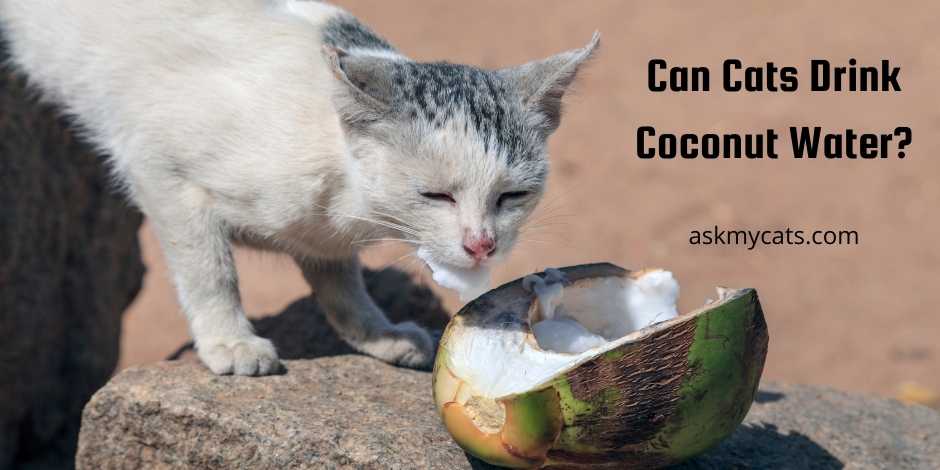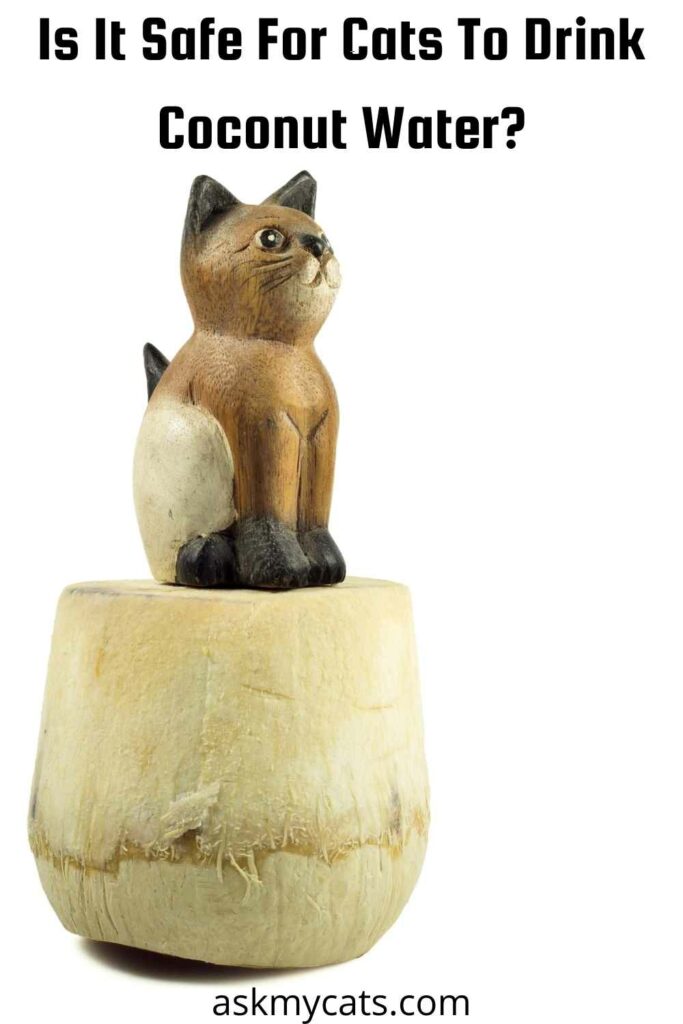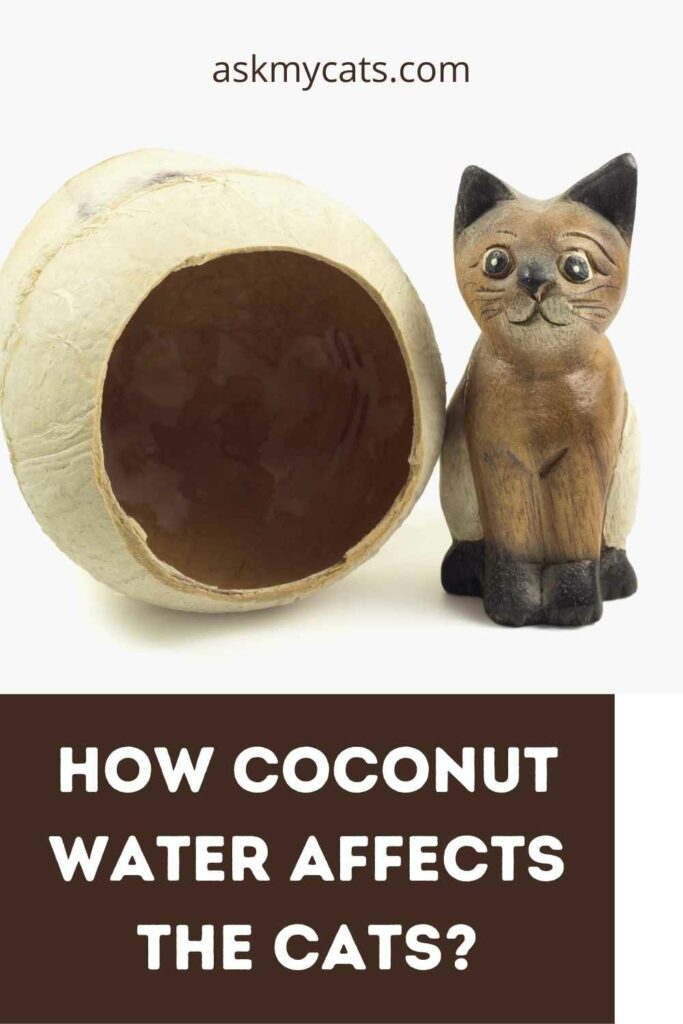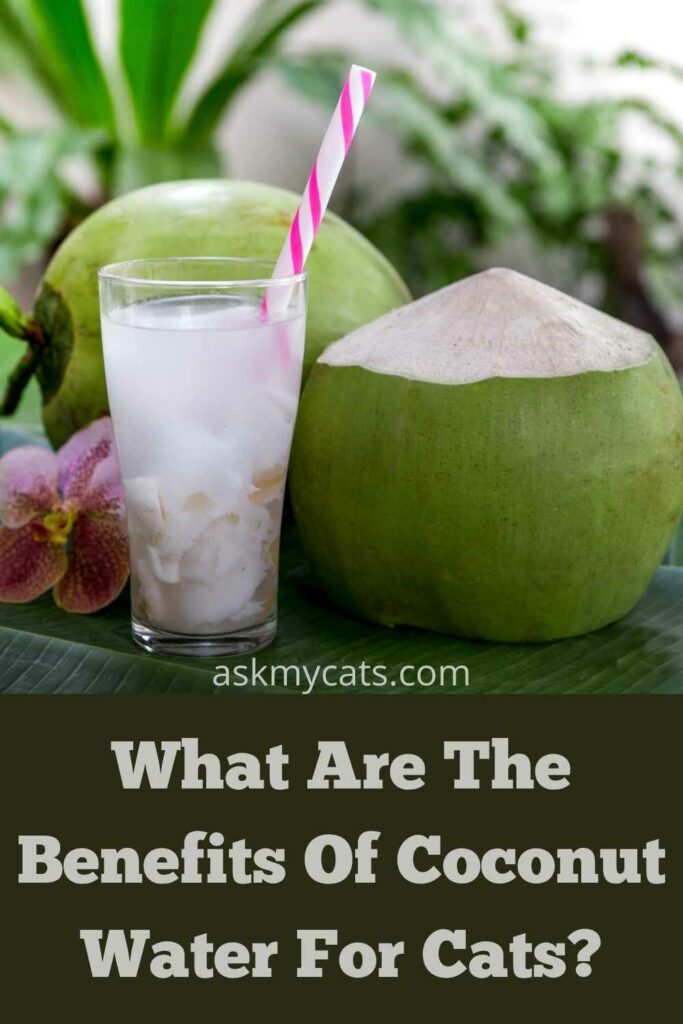All pet owners have always been concerned about their pet’s food. Every pet is unique, just like people, which is why owners must exercise greater caution with each one. Coconut water, on the other hand, is becoming increasingly popular these days.
We already know that coconut water is beneficial to people, but can we say the same for cats?
Coconut water is not toxic to cats. Coconut water includes triglycerides, which are beneficial to pets with digestive issues such as bloating, stomach pains, and so on. The vitamins and minerals in the water aid in the maintenance of their coats and the improvement of their immunity.
It’s something they can eat on occasion if they enjoy the taste. So, as long as the danger of diarrhoea doesn’t concern you, you may give your cat a small amount of coconut every now and again.


Give Your Cat the Perfect Day
Get the Free Ebook!
Is Coconut Water Good For Cats?
A small quantity of coconut water will not bother your cat’s health but daily providing him with large quantities of coconut milk can lead to gastrointestinal upsets.
Carbohydrates and electrolytes are abundant in coconut water. It has a lot of sodium, potassium, and magnesium in it. Coconut water is a great dehydrating agent because of all of these components.
Coconut water, on the other hand, cannot be used as a rehydration solution. Many foods designed for humans are usually hazardous to cats and other pets.
You’ll be pleased to learn that coconut water is excellent for kittens who are developing their immune. Coconut water can help them withstand illnesses and other health problems. The nicest part about coconut water is how tasty it is. Coconut water appeals to cats for this reason.
Is It Safe For Cats To Drink Coconut Water?
Coconut water is usually safe for cats to consume in modest amounts. However, owners must provide a little amount of coconut water to their cats.

Water should be given to them as a treat. Milk and sugar are not good for cats, as we all know. Coconut water, on the other hand, has high sugar content.
As a result, the amount of sugar must be kept below the limit, which is 10 grams per ounce. Because cats are not allowed to consume more than 8 ounces of water each day, you can use the water to rehydrate them.
Some cat owners have claimed that after drinking coconut water, their animals acted oddly. Cats have been known to act sedated or energetic at times.
In the same way that every person reacts differently to different foods, cats do as well. Coconut water is drinkable by certain cats in the same way as normal water. However, some cats have an odd reaction to it as a medication.
You might like to read do cats get bored of the same food
The problem with drinking coconut water is that it contains potassium, which might create problems. Potassium can harm a cat’s kidneys, and an excessive quantity of potassium can lead to Hyperkalemia.
As a result, it is recommended that you have your cats examined on a regular basis in order to keep them healthy and fit.
Water is essential for the survival of all living things and helps to maintain their general health. Cats have a modest thirst drive and get most of their water from their meals.
As a result, you should feed them foods that are rich in water content, such as 70-75 percent. If the cat’s diet contains a large amount of prepared food, she will get dehydrated. Because they don’t consume a lot of water, a high-water diet is necessary for them.
Another circumstance in which cats might be harmed is when they have renal disease. When a cat hunts and finds her own food, she usually consumes prey that has a lot of water.
As a result, because canned food has a higher moisture content, it is advised that you feed your cat canned food. If your cats refuse to drink water on a regular basis, you can use a syringe to give them water.
Cats have a lot of difficulties with their kidneys and bladders; therefore they need to eat a diet that is high in water. The canned food helps to flush a cat’s bladder, increasing pee production and so benefiting the animals.
The Cat’s diet must be high in water, low in carbs, and animal protein rather than plant protein. Cats have a lower water balance than dogs; therefore you should watch their food to avoid renal problems.
You may satisfy their water needs with foods such as clam juice, tuna water, beef or chicken broth, and so on. Cats can swiftly lose weight if their diet has very little water or none at all.
Coconut water is not only completely safe for cats and dogs, but it also offers a lot of potential health advantages for them.
Coconut water is high in vitamins and minerals and is a natural supply of fluids and electrolytes. It’s an excellent approach to avoiding dehydration in dogs and cats while also providing nutritional support.
Coconut water has been found to improve skin and coat problems, aid digestion, replenish fluid loss, alleviate arthritis, and even help with dementia in cats and dogs.
Check out Can Cats Eat Coconut? Is Coconut Safe For Cats?
How Does Coconut Water Affect The Cats?
When their felines were given coconut water to drink, several owners reported that some of their felines went sedated, while others became rambunctious.

Some cats drink it up like it’s nothing new, while others treat it as if it were a narcotic. Only a tiny amount of coconut water should be given to cats. Because it is high in sugar, it should be given to your pet as a treat.
Because it includes potassium, it should be used in moderation. Too much potassium can harm your pet’s kidneys, as well as cause Hyperkalaemia in cats. Before you offer your pet any coconut water for a change, consult your veterinarian.
Coconut water is high in carbs as well as electrolytes. It has significant levels of salt, potassium, and magnesium, making it an excellent dehydrating agent.
It is not suitable for rehydration. Coconut water is not hazardous to cats since it contains triglycerides, which are good for kitties suffering from digestive problems including bloating and stomach pains. It contains vitamins and minerals that help their coats and boost their immunity.
Coconut water is great for kittens to help develop their immune, making them more resistant to illnesses and other health concerns. The taste of coconut water is attractive to felines, so they will drink it freely.
However, just because your cat like coconut water doesn’t mean you shouldn’t keep an eye on his consumption. Coconut water’s high potassium and salt levels might harm your cat’s kidneys if he consumes too much of it.
Because too much potassium in your cat’s bloodstream can cause significant problems, you should avoid overfeeding coconut water or other potassium-rich foods to your cat.
Coconut water has a greater sugar level, therefore it’s crucial to avoid overfeeding your cat, since this can lead to weight gain and other problems associated with excessive sugar consumption.
If your cat is dehydrated, get expert advice from your veterinarian before attempting to rehydrate your cat with coconut water or any other treatment.
If your cat drinks a small amount of coconut water, it is unlikely to create any problems. However, if he drinks too much, it may be harmful; therefore if your cat drinks coconut water, it is necessary to get medical advice.
You might also like to read can cats have coconut oil
What Are The Benefits Of Coconut Water For Cats?
Coconut water has numerous health advantages for cats, including being low in calories, naturally devoid of fat and cholesterol, having more potassium, and being extremely hydrating to quench the thirst of your feline buddy.

Coconut water has a sweet, nutty flavor that is naturally refreshing. It includes sugar and electrolytes, which are readily absorbed carbs. Coconut water is a transparent liquid that is tapped from young, green coconuts and is not to be mistaken for high-fat coconut milk or oil.
Compared to a normal cat drink, it has fewer calories, less sodium, and more potassium. Most unflavoured coconut water has 5.45 calories per ounce, 1.3 grams of sugar, 61 milligrams of potassium, and 5.45 milligrams of salt in each ounce.
Gatorade, on the other hand, has 6.25 calories, 1.75 grams of sugar, 3.75 milligrams of potassium, and 13.75 milligrams of salt per serving.
Coconut water is the transparent liquid within coconuts, as opposed to coconut milk, which is a mixture of coconut water and shredded coconut. Coconut water is low in sugar and calories and has a slightly sweet, nutty taste.
Electrolytes such as potassium, sodium, and magnesium, on the other hand, aid to replace lost nutrients. That means it’s an excellent drink to have after a workout or during a little sickness, though it may not be much better than water.
Coconut water may be a healthy addition to your cat’s diet since it keeps your cat hydrated while being low in calories, fats, and cholesterol. Before you serve a bottle of coconut water to your cat, be sure you understand how it may impact the cats that have severe medical issues.
Other fruit juices may include a lot of sugar, calories, and carbohydrates. Coconut water, on the other hand, is calorie-free, making it an excellent choice for cats that enjoy sweet drinks.
Dry, tight, and flaky skin can result from a lack of moisture. Coconut water can help your cat to meet his daily hydration demands while also promoting circulation and glowing skin and fur. Vitamin C, which has a plethora of antioxidant qualities and naturally encourages collagen formation, is supplemented in some kinds of coconut water, which can help keep your cat’s skin firm and youthful-looking.
Hydration is critical for nourishing all of your cat’s body’s cells and improving his metabolic rate. Most of the cats confuse thirst for hunger, which leads to overeating and weight gain.
Moreover, while coconut water has more calories than ordinary water, it contains far fewer calories than other cat beverages. This easy substitution can help your cat to lose weight and shed those extra calories.
Check out can cats drink coconut milk
Does Coconut Water Help With Dehydration?
Coconut water contains potassium and natural sugars that rehydrate the body of your cat immediately, making it an ideal alternative if your cat has been sick or is suffering from a hangover.
Potassium helps the body maintain fluid and electrolyte balance, which improves nerve and muscle function in cats. Coconut water may be the ideal drink for rehydrating and replacing electrolytes lost during physical activity like playing and running.
Electrolytes are minerals that serve a variety of functions in the cat’s body, including maintaining fluid equilibrium. Potassium, magnesium, sodium, and calcium are some of the most important electrolytes.
Several studies have indicated that coconut water may be more helpful than water for rehydration for cats after exercise because it includes electrolytes like potassium and magnesium.
Is Coconut Water Better Than Water For Dehydration?
Coconut water is better than water for treating dehydration in cats.
While coconut water is low in calories, high in potassium, and devoid of fat and cholesterol, there is no evidence that it is truly better for hydration than plain water.
Coconut water offers fewer calories, less sodium, and more potassium than traditional sports drinks. Coconut water restored hydration after exercise better than water and on par with high-electrolyte sports drinks, according to two trials.
Coconut water is minimal in calories and sugar when compared to sodas or even sports drinks. Experts warn, however, that the product should not be used in place of water as the primary source of hydration.
When it comes to rehydration, research revealed that when comparing coconut water to ordinary water and a rehydration drink, all three supplied enough hydration. However, coconut water, which contains natural sugar and is a rehydration drink, restored blood sugar levels faster than water.
Frequently Asked Questions
Can you give coconut water to sick cats?
Yes, coconut water can be beneficial for sick cats by boosting their immunity.
How long can a cat go without drinking water?
With no water or food, it is unlikely that a cat would survive longer than three days.
Is coconut poisonous to cats?
Coconut and coconut-based goods, when consumed in small amounts, are unlikely to cause significant harm to your pet. Fresh coconut flesh and milk contain oils that can induce stomach discomfort, loose stools, and diarrhea. As a result, we recommend that you exercise caution while feeding these meals to your cats.
Final Words
While a modest amount of coconut water is unlikely to make your cat sick, a big amount may induce diarrhea and stomach problems. Coconut water avoids the problem of high fat and oil content that plagues coconut milk, but it’s still a beverage with which we would approach with caution.
If you have any unanswered questions, feel free to ask us in the comments section.
